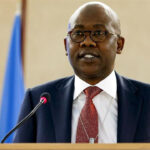
Inspite of the significant efforts and progress made in fighting malaria, it still remains perhaps the heaviest public health burden in Nigeria and causes over 100,000 deaths annually. For instance there were seven million confirmed cases of malaria and 6,087 deaths recorded in 2014, according to the World Malaria Report.
The disease is transmitted all year round, with peak transmission during the rainy season, in which we are now.
There are three main ways to fight malaria, vector control, which focuses on blocking the transmission of parasites by the mosquito vector from humans to mosquitoes and then back to humans, thereby reducing the disease burden; chemoprevention, which suppresses the blood-stage infection in humans and prevents malaria and lastly case management, which involves prompt diagnosis and treatment of malaria infections with appropriate antimalarial medicines.
With the high burden of the disease in the country, a lot still needs to be done in the area of diagnosis, prevention and treatment so as to achieve at least the global dateline for sustainable reduction of malaria by the year 2020.
In line with this, the federal government is also targeting the elimination of the disease in 2020 and has laid out some strategies to achieve it. Fighting the disease is not just the responsibility of government. There is need to support and sustain efforts or programmes being carried out or planned by government, towards tackling the disease.
International donors and development partners, individuals, the private sector as, well as state and local governments should support, fund and help in the implementation of these programmes or come up with successor programmes , and new ones that will tackle the disease in areas where it is endemic in the country.
These will help the country meet the 2020 target , save the lives of many Nigerians and also save cost.
There is need to close the huge gap in awareness creation. Many Nigerians are still unaware that the use of monotherapies like choloroquine have been banned for malaria treatment. There is need to supply the necessary test kits, and the recommended treatment drugs, artemisinin-combination therapies (ACTs) to facilities and make them available for the populace.
All hands must be on deck to make all these available and accessible to Nigerians in order to eliminate the disease.
To achieve the target, the National Malaria Elimination Programme of the Federal Ministry of Health recently developed a new strategic plan, NMSP 2014 – 2020. The current strategic plan is supposed to lead the country to pre-elimination by the year 2020, that means the national prevalence will be less than 5 percent.
One of the key objectives of the plan is to ensure that all persons with malaria seen in public or private health facilities, as well as those seen by community agents receive prompt treatment with an effective malaria drug.
Also the programme’s new focus is to test every fever case to confirm it’s malaria before treatment with ACT.
According to Dr Nnenna Ezeigwe, National Coordinator, National Malaria Elimination Programme (NMEP), integrated vector management is a key strategy to eliminate malaria in the country. That is targeting the vector of malaria (mosquito) and the key intervention in this area is the use of long lasting insecticide net.
She said that catching the mosquito at the breeding sight is a strategy for eliminating malaria in Nigeria. “I advise that individuals should always keep their environment clean, no storing of dirty water and apply general cleanliness.
Apply indoor residual spray and also sleep in a long lasting insecticidal net,’’ she advised.
Rapid Diagnostic Test (RDTs) devices need to be available at private hospitals too and to patent medicine vendors in rural areas.The recommended malaria drugs should be made available to Nigerians at subsidized rates. State governments and the private sector for instance have a lot of work to do in this area.
According to the Clinton Health Access Initiative, there is still low testing rates by the private sector and public sector. There is also low awareness and poor perception on the importance of malaria diagnosis. Regulatory barriers, restrict testing by the private sector which sees 68% of fever cases.No supply chain channels currently exists for mRDTs in the private sector, the organization said.
One project which has done a lot in helping Nigeria to be malaria free, is the Support to National Malaria Programme (SuNMaP). It is one of the largest programmes funded by the Department for International Development (DFID)/UK aid. Led by Malaria Consortium, in partnership with GRID Consulting and Health Partners International, the programme has contributed significantly to the declining malaria rates and deaths in Nigeria.
The programme focus was to support government malaria control efforts by providing technical assistance for building the National Malaria Elimination Programme (NMEP) and State Malaria Elimination Programmes (SMEPs), and building capacity of local government areas (LGAs) in service delivery and health programme management.
The programme was implemented in 10 states: Lagos, Anambra, Kano, Niger, Ogun and Kaduna, Jigawa, Enugu, Katsina and Yobe covering 40 percent of the Nigerian population.
The eight year project which came to an end last month provided technical assistance to the Nigerian National Malaria Elimination Programme (NMEP) to scale up malaria control across ten states, and supported it to develop research priorities and national strategies, burgeoning commercial sector for supplies and health system strengthening. It also built capacity for more effective programme management, and trained health workers. About 23,000 health workers were trained to diagnose and treat malaria in their communities.
From 2008, to date, SuNMaP saved the lives of 48,000 children under the age of five. Distributed twelve million long-lasting insecticidal nets, contributing to the increase in coverage from 7 to 58 percent between 2008 and 2014 2.7 million malaria. Rapid diagnostic tests and 2.7 million antimalarial drugs (artemisinin-combination therapies – ACTs) were distributed. Over 5 million ACTs were sold through the strengthened commercial sector.
Speaking on the impact of the project in Ogun State during the end of project dissemination, Dr Babatunde Ipaye, Commissioner for Health in Ogun, said that 600,000 long lasting insecticidal nets were distributed particularly to pregnant women across the state.
He said that over 500,000 people in the state have benefited from high quality ACTs. He added that the state also benefited from systems development and planning, saying since 2011 SuNMaP has supported the plan effectively and strengthened coordination.
Mr Ben Mellor, Head of the UK-DFID in Nigeria, said the programme cost 89 million Pounds for the period it lasted.
There is still more to be done in these states, and there is need to push this to the other states in which the programme was not implemented .The next question now is after SUNMAP what next?
Chief Executive of Malaria Consortium, Charles Nelson, said if we are to meet the global targets for defeating malaria, the world must continue to support Nigeria to make significant progress during the SDG era. “Eliminating the disease in currently low transmission settings is clearly important – but we need to continue efforts where the burden of malaria remains highest.”
In order to sustain the recent advances and then accelerate progress in Nigeria, it is important that the successor to SuNMaP supports the Nigerian Government to keep up and even build on this momentum, and achieve their ambitious target of reducing malaria deaths to zero by 2020.
There is need for increased funding and budgetary allocations for malaria by all stakeholders and just as Mr Nelson said: “Defeating malaria in Nigeria will not be an easy task. It will require a doubling of malaria funding, from both the international donor community and Nigerian domestic sources.”



